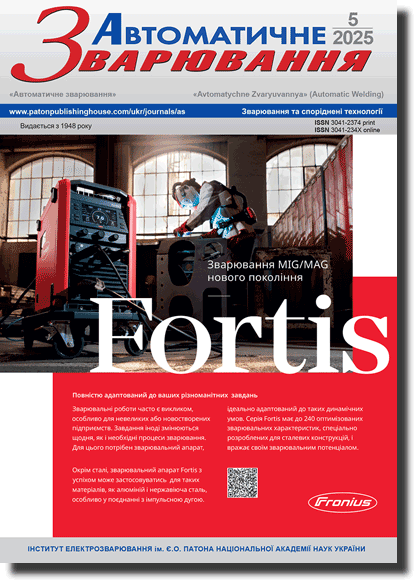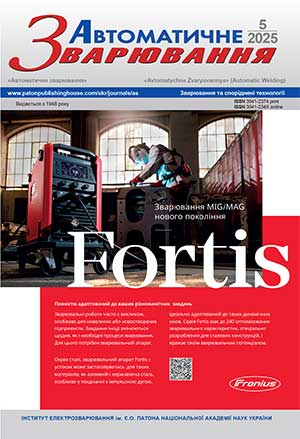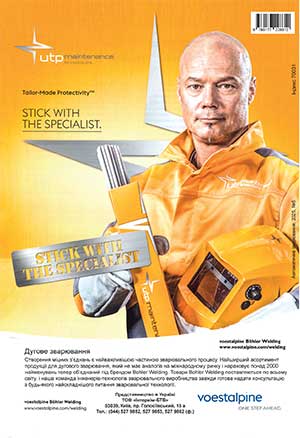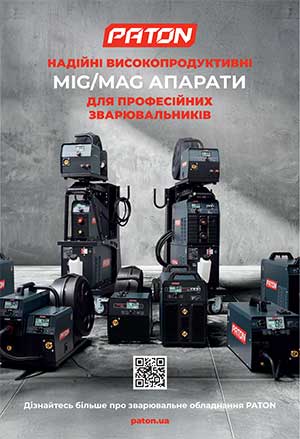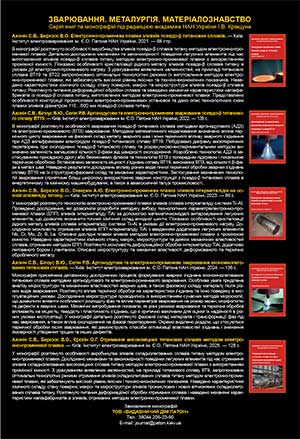| 2025 №05 (09) |
DOI of Article 10.37434/as2025.05.01 |
2025 №05 (02) |
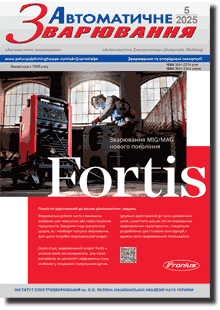
"Avtomatychne Zvaryuvannya" (Automatic Welding), #5, 2024, pp. 5-15
Investigations of technological processes of treatment of metal alloys and welded joints by electromagnetic field (Review)
L.M. Lobanov1, L.I. Nyrkova1, M.O. Pashchyn1, O.L. Mikhodui1, O.M. Tymoshenko1, N.L. Todorovych1, O.M. Syzonenko3, I.P. Kondratenko2, V.V. Chopyk2, О.М. Karlov2
1E.O. Paton Electric Welding Institute of the NAS of Ukraine 11 Kazymyr Malevych Str., 03150, Kyiv, Ukraine. E-mail: svarka2000@ukr.net2Institute of Electrodynamics of the NAS of Ukraine. 56 Beresteiskyi Ave., 03057, Kyiv, Ukraine. E-mail: dep7ied@ukr.net
3Institute of Pulse Processes and Technologies of the NAS of Ukraine. 43a Bohoyavlensky Ave., 54018, Mykolaiv, Ukraine. E-mail: dioo@iipt.com.ua
An analysis of promising technologies for improving the mechanical characteristics and stressed states of metal alloys and welded joints based on the use of electromagnetic fields and their derivatives, such as electrodynamic pressure force, eddy currents, and shock waves, is carried out. The process of electrohydro-pulse treatment by a high-energy discharge (EPT HED EHIPD) with application of a hydrocarbon liquid for the production of polydisperse mixtures used for alloying the weld metal of welded joints as part of flux-cored wires, is considered. The positive effect of microadditives of the Ti-TiC system modifier, obtained by EPT HED, on the operational properties of the deposited metal of the 25Kh5FMS tool steel type was determined. It is shown that treatment with a pulsed electromagnetic field (PEMF) improves the residual stressed states of welded joints. New technological schemes for the application of electrodynamic treatment (EDT) of welded joints are considered. The advantages of these two treatments of the weld metal in the welding process in comparison with processing at room temperature are proved. The mechanism of surface hardening of 25KhGNMT steel as a result of its treatment with a pulsed barrier discharge (PBD) was investigated. It is proved that the PBD increases the dislocation density and refines the microstructure, which has a positive effect on the mechanical characteristics of steel. Prospects for its use for non-destructive testing of residual stressed states of welded joints are considered. 46 Ref., 6 Fig.
Keywords: welded joint, electromagnetic field treatment, electrodynamic treatment, residual stresses, fusion welding, surface hardening, titanium carbide, polydisperse mixtures, residual deformations, aluminum alloys, structural steels, dislocation density
Received: 09.05.2025
Received in revised form: 09.06.2025
Accepted: 29.09.2025
References
1. Razmyshlyaev, A.D., Ageeva, M.V. (2018) On mechanism of weld metal structure refinement in arc welding under action of magnetic fields (Review). The Paton Welding J., 3, 25-28. https://doi.org/10.15407/tpwj2018.03.052. Dubodelov, V.I., Goryuk, M.S. (2018) The use of electromagnetic fields and magnetohydrodynamic phenomena to intensify the influence on metal systems: World and Ukrainian experience. In: Science of Materials: Achievements and Prospects. In: 2 Vol. Vol. 2. Ed. by L.M. Lobanov et al. Kyiv, Akademperiodyka, 24-50 [in Ukrainian].
3. Opara, V.S., Reznikova, L.Y., Yurchenko, E.S., Petushkov, V.G. (1984) Influence of welded joint stiffness on reduction of residual stresses during electrohydroimpulse processing. Avtomatycheskaya Svarka, 7, 70-71 [in Russian].
4. Sizonenko, O., Vovchenko, A. (2014) Рulsed discharge technologies of processing and obtainment of new materials (Review). Machines. Technologies. Materials, 8(12), 41-44. https://stumejournals.com/journals/mtm/2014/12/41
5. Lipyan, E.V., Sizonenko, O.N., Torpakov, A.S., Zhdanov, A.A. (2015) Thermodynamic analysis of heterogeneous chemical reactions in the system «mixture of Fe-Ti powders- hydrocarbon liquid» under the influence of high-voltage electric discharges. Visnyk NTU KhPI. Seriya: Tekhnika ta Elektrofizyka Vysokykh napruh:Coll., 51(1160), 59-65 [in Russian].
6. Syzonenko, О.М., Prokhorenko, S.V., Lypyan, E.V., Zaichenko, A.D. et al. (2020) Pulsed discharge preparation of a modifier of Ti-TiC system and its influence on the structure and properties of the metal. Mater. Sci., 56(2), 232-239. DOI: https://doi.org/10.1007/ s11003-020-00421-1 7. Lobanov, L.M., Syzonenko, O.M., Holovko, V.V. et al. https://doi.org/10.1007/s11003-020-00421-1
(2021) Pulsed-discharge treatment of the Al-Ti-C system modifier. The Paton Welding J., 5, 24-29. https://doi.org/10.37434/tpwj2021.05.04
8. Lobanov, L.M., Ryabtsev, I.O., Pashchyn, M.O. et al. (2023) Wear resistance of titanium carbide-modified 25Kh5FMS deposited metal. Strength of Materials, 55(3), 469-474. https://doi.org/10.1007/s11223-023-00539-y
9. Ryabtsev, I.O., Babinets, A.A., Pashchin, M.O. et al. (2023) Influence of different types of modifiers on the structure and properties of deposited metal of the type of 25Kh5MFS tool steel. The Paton Welding J., 5, 11-14. https://doi.org/10.37434/tpwj2023.05.02
10. Sprecher, A.F., Mannan, S.L., Conrad, H. (1986) Overview no. 49: On the mechanisms for the electroplastic effect in metals. Acta Metallurgica, 34(7), 1145-1162. https://doi.org/10.1016/0001-6160(86)90001-5
11. Baranov, Yu.V., Troitsky, O.A., Avramov, Y.S. (2001) Physical bases of electric pulse and electroplastic processing and new materials. Moscow, MGIU [in Russian].
12. Stepanov, G.V., Babutskii, A.I., Mameev, I.A. (2004) High-density pulse current-induced unsteady stress-strain state in a long rod. Strength of Materials, 36(4), 377-381. https://doi.org/10.1023/B:STOM.0000041538.10830.34
13. Strizhalo, V.A., Novogrudsky, L.S., Vorobyev, E.V. (2008) Strength of materials at cryogenic temperatures taking into account the influence of electromagnetic fields. Vol. 1. Strength of materials and structures: A series of monographs. Ed. by V.T. Troshchenko, Kyiv, IPS [in Russian].
14. Troitsky, O.A., Kalymbetov, P.U. (1981) Dependence of the electroplastic effect in zinc on the duration of individual pulses. Fizika Metallov i Metallovedenie, 51(5), 1056-1059 [in Russian].
15. Stepanov, G.V., Babutskii, A.I., Mameev, I.A., Olisov, A.N. 2006() Analysis of pulse current-induced tensile stress relaxation. Strength of Materials, 38(1), 84-91. https://doi.org/10.1007/s11223-006-0019-4
16. Strizhalo, V.A., Novogrudskij, L.S. (1997) Determination of the electroplastic strain energy of metals. Problemy Prochnosti, 4, 38-43. https://www.scopus.com/record/display.uri?eid=2-s2.0-0031108852&origin=recordpage
17. Morris, J.W., Fultz, B., Chan, J. W., Mei, Z. (1989) The influence of high magnetic fields on mechanical properties of metastable austenitic steels. Fizika Nizkikh Temperatur, 15(10), 594-599. https://doi.org/10.1063/10.0032269
18. Guoyi Tang, Zhuohui Xu, Miao Tang, Xihua Chen, Huihua Zhou, Anli Lu (2005) Effect of a pulsed magnetic treatment on the dislocation substructure of a commercial high strength steel. Mater. Sci. and Engin.: A., 398(1-2), 108-112. https://doi.org/10.1016/j.msea.2005.03.003
19. Liping Ma, Wenxiang Zhao, Zhiqiang Liang et al. (2014) An investigation on the mechanical property changing mechanism of high speed steel by pulsed magnetic treatment. Mater. Sci. and Engin.: A, 609, 16-25. https://doi.org/10.1016/j.msea.2014.04.100
20. Batainen, O., Klamecki B., Koepke B. (2003) Effect of pulsed magnetic treatment on drill wear. J. Mater. Proc. Technol., 134(2), 190-196. https://doi.org/10.1016/S0924-0136(02)01002-6
21. Babutsky, A., Chrysanthou, A., Ioannou, J. (2009) Influence of pulsed electric treatment on corrosion of structural metals. Strength of Materials, 4, 387-391. https://doi.org/10.1007/s11223-009-9142-3
22. Babutsky, A., Chrysanthou, A., Ioannou, J., Mamuzic, I. (2010) Correlation between the corrosion resistance and the hardness scattering of structural metals treated with a pulse electric current. Mater. Technol., 44(2), 99-102. http://mit.imt.si/izvodi/ mit102/babutsky.pdf
23. Bigyan Fang, Jinqiu Wang, Suhong Xiao (2005) Stress corrosion cracking of X-70 pipeline steels by electropulsing treatment in near-neutral pH solution. J. Mater. Sci. Technol., 40(24), 6545-6552. https://doi.org/10.1007/s10853-005-1813-2
24. Golovin, Yu.I., Morgunov, R.B., Zhulikov, S.E. et al. (1998) Influence of magnetic field on metastable structural defects relaxation and plasticity of crystals. Vestnik TGU, 3(3), 271-274 [in Russian].
25. Klimov, K.M., Burkhanov, Y.S., Novikov, I.I. (1985) Effect of high conductivity electric current on the process of plastic deformation of aluminum. Problemy Prochnosti, 6, 44-47 [in Russian]. https://doi.org/10.1007/BF01528728
26. Semashko, N.A., Krupsky, R.F., Kupov, A.V. (2004) Acoustic emission during electric pulse deformation of titanium alloys. Materialovedenie,7, 29-33 [in Russian].
27. Stepanov, G.V., Babutskii, A.I., Mameev, I.A. et al. (2011) Redistribution of residual welding stresses in pulsed electromagnetic treatment. Strength of Materials, 43(3), 326-331. https://doi.org/10.1007/s11223-011-9300-2
28. Lobanov, L.M., Pashchyn, M.O, Mikhodui, O.L. et al. (2021) Pulsed electromagnetic field effect on residual stresses and strains of welded joints of AMg6 aluminum alloy. Strength of Materials, 53(6), 834-841. https://doi.org/10.1007/s11223-022-00350-1
29. Yanli Song, Lin Hua (2012) Mechanism of residual stress reduction in low alloy steel by a low frequency alternating magnetic treatment. J. Mater. Sci. Technol., 28(9), 803-808. https://doi.org/10.1016/S1005-0302(12)60134-0
30. Tsaryuk, A.K., Skulsky, V.Yu., Moravetsky, S.I., Sokirko, V.A. (2008) Influence of electromagnetic treatment on residual welding stresses in welded joints of carbon and low-alloyed steel. The Paton Welding J., 9, 22-25.
31. Shao Quan, Kang Jiajie, Xing Zhiguo et al. (2019) Effect of pulsed magnetic field treatment on the residual stress of 20Cr-2Ni4A steel. J. of Magnetism and Magnetic Materials, 476, 218-224. https://doi.org/10.1016/j.jmmm.2018.12.105
32. Lobanov, L., Kondratenko, I., Zhiltsov, A., Pashchin, N., Mikhodui, O. (2018) Development of post-weld electrodynamic treatment using electric current pulses for control of stress-strain states and improvement of life of welded structures. Materials Performance and Characterization, 7(4), 941-955. https://doi.org/10.1520/MPC20170092
33. Han Shanguo, Lobanov, L.M., Cai Detao et al. (2016) Portable welding deformation control equipment and deformation treatment method thereof. European Patent Office. Priority number(s): CN201510142968 20150330. Bibliographic data: CN104722978 (B) - 2016-04-27. https://worldwide.espacenet.com/publicationDetails/biblio?CC=CN&N R=104722978B&KC=B&FT=D&ND=5&date=20160427&DB=&locale=en_EP
34. Lobanov, L.M., Kondratenko, I.P., Pashchyn, M.O., Volkov, S.S. (2021) Method for eliminating residual stresses and deformations in welded joints and device for its implementation. Patent for invention 122829, 06.01.2021 [in Ukrainian].
35. Lobanov, L.M., Kondratenko, I.P., Pashchyn, M.O., Volkov, S.S. (2021) Method for eliminating residual stresses and deformations in welded joints and device for its implementation. Patent for invention 122933, 20.01.2021 [in Ukrainian].
36. Lobanov, L.M., Korzhik, V.M., Pashchin, M.O. et al. (2022) Deformation-free TIG welding of AMg6 alloy with application of electrodynamic treatment of weld metal. The Paton Welding J., 8, 3-8. https://doi.org/10.37434/tpwj2022.08.01
37. Dubodelov, V.I., Seredenko, Ye.V., Zatulovskyi, A.S., Seredenko V.A. (2018) Increase of properties of aluminum alloys by the action of a permanent magnetic field on melting at solid state. The Sci. Technical J. Metal Science and Treatment of Metals, 24(4), 3-8. https://doi.org/10.15407/mom2018.04.003
38. Bobrinsky, V.I., Rodin, N.P., Fomicheva, L.F., Yusupov, R.Y., Glushchenko, V.A., Igolkin, A.Y. (2006) Fusion welding method. Patent 2288823 RF, publ. 20.12.2006 [in Russian].
39. Akinin, K.P., Antonov, O.E., Petukhov, I.S. et al. (2010) Construction of electromechanical energy converters of increased efficiency. Pratsi Instytutu Elektrodynamiky, NANU :Coll., Vol. 26, 3-12 [in Ukrainian].
40. Antonov, O.E., Mikhalskyi, V.M., Petukhov, I.S., Shapoval, I.A., Chopyk, V.V. (2012) Investigation of processes in electromechanical and semiconductor energy converters. Pratsi Instytutu Elektrodynamiky NANU: Coll., Vol. 32, 5-19 [in Ukrainian].
41. Lobanov, L.M., Pashchyn, M.O., Mikhodui, O.L. et al. (2025) Scientific principles of magnetic pulse treatment of welded joints in the process of fusion welding. In: Welding and Related Technologies, Ed. by I.V. Krivtsun et al., 183-187. https://doi.org/10.1201/9781003518518
42. Bo Jiang, Jingtang Zheng, Shi Qiu et al. (2014) Review on electrical discharge plasma technology for wastewater. Chemical Engineering J., 236, 348-363. https://doi.org/10.1016/j.cej.2013.09.090
43. Bozhko, I.V., Zozuljov, V.I., Kobylchak, V.V. (2016) SOS-generator for the electric discharge technology used pulse barrier discharge. Tekhnichna Elektrodynamika, 2, 63-68 [in Ukrainian]. https://doi.org/10.15407/techned2016.02.063
44. Bozhko, I.V., Kondratenko, I.P., Lobanov, L.M. et al. (2023) Pulsed barrier discharge for treatment of surfaces of 25Kh- GNMT steel plates. Tekhnichna Elektrodynamika, 1, 76- 80 [in Ukrainian]. https://doi.org/10.15407/techned2023.01.076
45. Lobanov, L.M., Knysh, V.V., Pashchin, M.O., Kot, V.G. et al. (2023) Nondestructive evaluation of residual stresses in welded joints on the base of a combination of ultrasonic testing and speckle-interferometry. Tekhnichna Diahnostyka ta Neruinivnyi Kontrol, 2, 22-27[in Ukrainian]. https://doi.org/10.37434/tdnk2023.02.03
46. Lobanov, L.M., Pashchyn, M.O., Mikhodui, O.L. et al. (2022) Stress-strain state of welded joints of AMg6 alloy after electrodynamic treatment during welding. Strength of Materials, 54(6), 983-996. https://doi.org/10.1007/s11223-023-00474-y
Advertising in this issue:
To order the electronic version of the paper:
L.M. Lobanov, L.I. Nyrkova, M.O. Pashchyn, O.L. Mikhodui, O.M. Tymoshenko, N.L. Todorovych, O.M. Syzonenko, I.P. Kondratenko, V.V. Chopyk, O.M. KarlovInvestigations of technological processes of treatment of metal alloys and welded joints by electromagnetic field (Review)
Automatic Welding №05 2025 p.5-15
The cost of article (pdf): 13 $, 12 €, 150 UAH (1 copy. )
fill in the form below:
The cost of subscription/purchase order journals or individual articles
| Journal/Currency | Annual Set | 1 issue printed |
1 issue |
one article |
| TPWJ/USD | 384 $ | 32 $ | 26 $ | 13 $ |
| TPWJ/EUR | 348 € | 29 € | 24 € | 12 € |
| TPWJ/UAH | 7200 UAH | 600 UAH | 600 UAH | 280 UAH |
| AS/UAH | 1800 UAH | 300 UAH | 300 UAH | 150 UAH |
| AS/USD | 192 $ | 32 $ | 26 $ | 13 $ |
| AS/EUR | 180 € | 30 € | 25 € | 12 € |
| SEM/UAH | 1200 UAH | 300 UAH | 300 UAH | 150 UAH |
| SEM/USD | 128 $ | 32 $ | 26 $ | 13 $ |
| SEM/EUR | 120 € | 30 € | 25 € | 12 € |
| TDNK/UAH | 1200 UAH | 300 UAH | 300 UAH | 150 UAH |
| TDNK/USD | 128 $ | 32 $ | 26 $ | 13 $ |
| TDNK/EUR | 120 € | 30 € | 25 € | 15 € |
AS = «Automatic Welding» - 6 issues per year;
TPWJ = «PATON WELDING JOURNAL» - 12 issues per year;
SEM = «Electrometallurgy Today» - 4 issues per year;
TDNK = «Technical Diagnostics and Non-Destructive Testing» - 4 issues per year.




